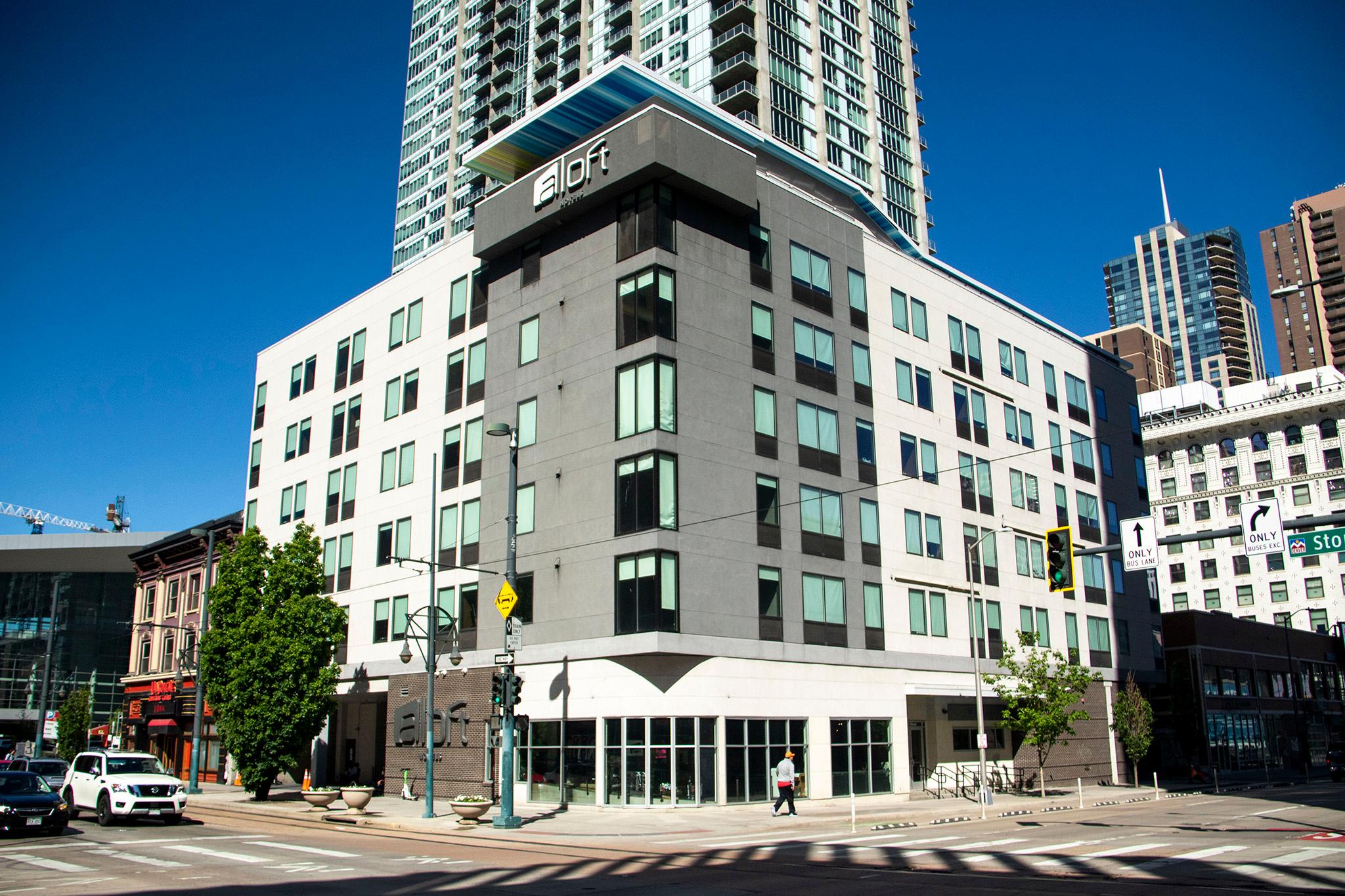The debate over who Downtown Denver is for -- and who should be pushed out -- continued at City Council this week.
A handful of residents from the luxury Spire Condos and the Upper Downtown Neighborhood Association, or UpDoNa, told lawmakers Monday night that the city should end its contract with JBK Hotels. The arrangement opens individual rooms for unhoused people at the Aloft Denver Downtown, a hotel at 15th and Stout Streets.
Aloft is one of four hotels where Denver's Department of Housing Stability, or HOST, has made available a total of 563 individual rooms for people experiencing homelessness who are vulnerable to COVID-19. Of the people who have stayed in these hotels, 343 have been moved into permanent housing, and 70 of those were from Aloft. The Salvation Army operates the hotel, in partnership with HOST.
This type of shelter has been touted as an innovative solution to the city's homelessness crisis by Mayor Michael Hancock and other proponents of the city's urban camping ban, along with many of its opponents. They say it's a smart way to keep the rising number of unhoused people off of the streets and move them toward permanent housing.
But members of UpDoNa told City Council that sheltered people experiencing homelessness at Aloft are ruining their neighborhood, hurting the downtown economy and causing safety and sanitation issues.
Trying to block the shelter, UpDoNa members said, is about protecting children who attend events at the Convention Center from several registered sex offenders who live at Aloft and ensuring both housed residents and tourists can walk through downtown without seeing people using drugs and experiencing harassment.
Longtime homeless advocate and Aloft resident Randle Loeb said the program has saved the lives of people like him, that it's well run, and that the building's residents are not causing trouble.
"Every single day, when I wake up in the morning, I get up with the idea of contributing to the society and the community I live in," he said. "The fact is that [Aloft] is well managed, with case management and acute care for people. And the atmosphere in this building is safe and sound.
"And without it, I daresay that a number of people would be out there in the alleys in many places where businesses are and where things are awry," he continued. "It is not necessarily true, either, that the people living here are contributing to drug trafficking, are being a nuisance, or are being deviant in their behaviors."
If opponents of Aloft have their way, Denver would lose 140 rooms for unhoused people at risk of having health complications with COVID-19. Finding a new hotel is far from guaranteed and many of those temporary residents would likely end up on the street.
Here's the background.
Since its earliest days, downtown has had waves of people experiencing homelessness -- and social movements to get rid of them.
A short walk away is the decades-long site of many of Denver's homeless services: The Colorado Coalition for the Homeless, the Salvation Army, the Stout Street Clinic, Urban Peak and the Denver Rescue Mission. Many of those services existed long before the arrival of the condo and apartment buildings which have risen in recent years.
Downtown has been the hub for homeless shelters because many neighborhoods have single-family zoning designed to prevent shelters, treatment facilities and other social services from locating there. Those neighborhoods effectively -- and intentionally -- bar people experiencing homelessness and concentrate poverty in other parts of town with looser zoning restrictions, including the city center.
A decade ago, downtown residents and business owners made many of the same arguments UpDoNa is making about Aloft in the fight to ban urban camping.
At the time, unhoused people were sleeping on the 16th Street Mall, and their presence was hurting business, opponents of unsheltered homelessness argued. Lost revenue would cost the city tax dollars that could go to finding shelter for people. Despite loud opposition from unhoused people and their allies, Hancock signed the urban camping ban that has been on the books ever since.
In 2019, homelessness advocates launched a ballot initiative to overturn the urban camping ban. A $2 million opposition campaign argued urban camping was inhumane, unhoused people needed shelter, and that "we can do better."
In the years since the camping ban and the promise to "do better," unsheltered and sheltered homelessness has multiplied in the city, in part because of the pandemic and also a raging opioid epidemic.
One in four unhoused people is unsheltered, according to Angie Nelson, HOST's deputy director of housing stability and homelessness resolution. In response to the increase in homelessness, the department has just completed the second of two housing surges, putting hundreds of people into stable homes.
A recent study, using Denver Health data, showed that indoor shelters are riskier for COVID-19 transmission than encampments. Because congregate shelters -- spaces where many people sleep in the same room -- proved to be less safe during the pandemic, the city contracted with four hotels to ensure the most vulnerable had a room with a door to stay indoors and safe.
"Many guests at the Aloft in particular use wheelchairs or walkers for mobility, utilize oxygen tanks, or have other severe health conditions," Nelson told City Council's Finance and Governance Committee on Tuesday. "They're either age 65 and older or have an underlying health condition as defined by the CDC as making them more vulnerable to COVID."
If the people living at Aloft were to lose their housing, some would likely opt to stay outside, on the streets, trying to avoid a disease that could kill them, she said.
The program was first approved in May of 2020. If renewed, the city will spend $2.5 million on housing people at Aloft and about $3.3. million on food. Since the program's inception, the city has spent more than $16 million on food and housing for the project.
Program costs are $95 per guest per night and $25 per person for three meals a day. The contract extension would cover services through the end of the year.
Here's what opponents of the Aloft contract said to City Council -- and how lawmakers responded.
Lisa Pope, the co-founder and vice president of UpDoNa who has lived in the area for nine years, told City Council that business owners, residents and visitors initially supported Aloft.
"We have peacefully coexisted for over two years," she said. "However, as Downtown Denver began opening up and people started getting out and about again, we saw the negative impacts to Upper Downtown and its recovery from the continued use of this hotel as a shelter."
Because the Aloft Hotel is a "low-barrier shelter," the men there are permitted to use drugs and alcohol, she said. "However, they are not allowed to do so inside the hotel. So they do it outside the hotel in our alleys, parking lots, and in front of and in other businesses."
Concerned about this allegation, Councilmember Amanda Sawyer asked Nelson about the claim in the Finance and Governance Committee.
"I don't know that many people who have a private space with a door that closes, who then choose to go outside to use," Nelson said. "Certainly the rules of the facility would make it so that they cannot and should not use substances on site. I don't know many apartments that say you can use substances on site -- and people do."
Drug use, of course, is not permitted on the streets, and arrests there are more likely.
Nelson said HOST is in regular discussions with the UpDoNa. The agency has 'round-the-clock security on-site seven days a week and collaborates with the Denver Police Department on safety matters. HOST is also in conversations with the Salvation Army about ensuring that people don't leave the building, use drugs in the area, and return intoxicated.
"There's an assumption that anyone else experiencing homelessness in the vicinity of that area or anyone seen using substances in the vicinity of that area: 'Oh, that must be attributable to the Aloft. That must be an Aloft guest,'" said Nelson. "And so we've, in our conversations, been trying to talk with this group around, you know, how that perception is not accurate."
Pope also pointed out that Governor Polis declared an end to Colorado's COVID-19 health emergency in July of 2021. Social distancing, masking and stay-at-home orders were no longer in effect then.
"Is it necessary to continue to spend federal and state dollars to keep using the Aloft hotel as an emergency COVID shelter?" she asked. "The men who stay there are free to come and go, and they expose themselves to the very thing that the shelter's supposed to protect them from. In addition ... they are not required to be vaccinated."
But COVID is far from over, pointed out Councilmember Robin Kniech in the Finance and Governance Committee. Denver case numbers are rising and hospitalizations are up 200%.
In response, the Colorado Department of Public Health and Environment has tightened restrictions on shelters.
"Our case rates are rising to the point where a state health order regarding masks in our shelters was just reinstated, so that we can provide protection for those who are vulnerable," said Nelson. "Our public health orders are intact."
Pope suggested the city shift to a month-to-month contract and use the funds from the temporary shelter to pay for addiction treatment, mental health services and permanent housing.
Sue Townsend, a physician and UpDoNa member, said she initially supported the emergency shelter at Aloft. But as the pandemic has become more manageable, her enthusiasm for the approach has waned.
"Clearly, low-barrier crisis housing is a necessary part of the Host Program, and the FEMA pandemic dollars may have been useful to help protect people at high risk of dying from COVID," she said. "However, I do not support renewing the lease at the Aloft hotel, to continue to provide these crisis services. With the combination of mental health issues, trash, violent crime and drug use that the neighborhood is experiencing as a result of this ongoing temporary plan, renewing its lease seems unwise and problematic."
Rob Squire, UpDoNa's board president, commended HOST for its efforts and said "we're about to select a homeless charity that we're going to align ourselves with and for whom we're going to be performing fundraisers."
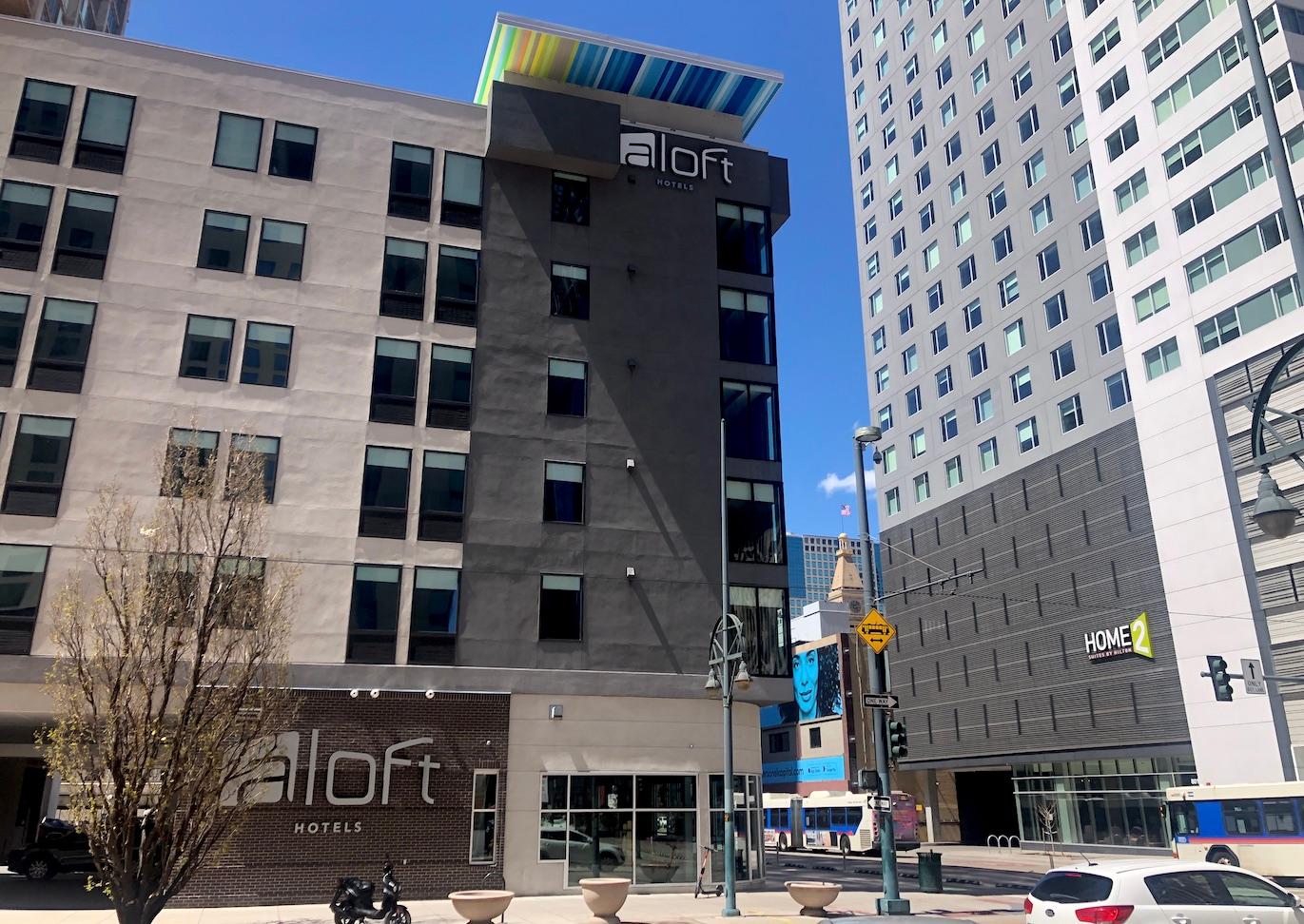
Yet he was concerned about open drug use, people lining in front of Aloft and verbally harassing and catcalling people, as well as sex offenders who were living there, near the Convention Center, where teenage girls and families come for volleyball tournaments, choir gatherings and other events.
"What if a teenage girl who was part of a convention that the city of Denver brought here was sexually assaulted or worse by a sexually violent predator that that same City of Denver had placed 100 paces from the front door of the Convention Center," he said. "Imagine the lawsuits, imagine the headlines, and imagine the national news stories. Imagine what that would do to Denver's fragile convention business. Imagine what it would do to Denver's recovering economy.
"The shelter is simply in the wrong place and should be moved somewhere else," he continued. "Please move it somewhere where it doesn't have such an impact on Denver's recovering economy. Move it someplace out of the Central Business District where it doesn't impact ... hotel business."
Another UpDoNa member, Carly Ebenstein, described herself as a liberal supporter of Denver's efforts to find solutions for the unhoused. She argued the Aloft shelter is an untenable solution.
She lives in the nearby 496-luxury condo building, Spire, built in 2009. Recently units have sold for between $400,000 and $1,395,000. It's a steep price, but residents have been promised access to rich amenities and the best Denver has to offer.
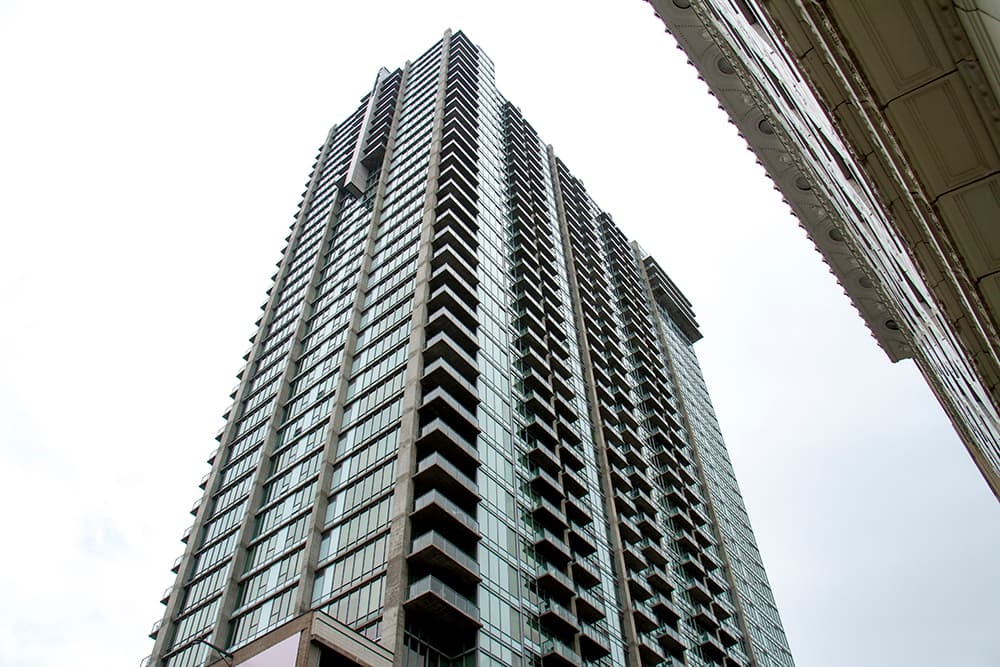
"The Aloft is right in the middle of our crown jewel, our entertainment and convention districts," she said. "This area brings more revenue to the city and state than most areas of Colorado. For that reason, I do not understand why the city would sabotage efforts to attract new convention opportunities with a sustainable business model by forging ahead with a misaligned housing program that seems incongruent with the city's prospects and growth for prosperity."
She criticized the Salvation Army staff for failing to monitor activities outside the building.
"As a resident of Spire, I see increased open drug use, defecation, urination, abusive and inappropriate behaviors not normal to a functioning society now surrounding Aloft, the Spire building where we live and the many dark alleys and doorways," she said. "It's difficult to comprehend how we came to the conclusion that releasing sexually violent predators into transitional housing at this particular Aloft, next to the Convention Center, was a good idea."
She argued the city was inconsistent in policing and cleaning the neighborhood and that it only did so when there was a large convention.
"There needs to be a permanent solution and not a whack-a-mole solution when important conventions arrive," she said. "It's almost like we're taking a playbook out of the Russian playbook. You know, avoid, avoid, avoid, cover up, cover up, and then we can have our big Mayday parade that highlights all the wonderful things and how clean our city is for the conventioneers. But for some reason, the day-to-day residents are not treated with the same respect."
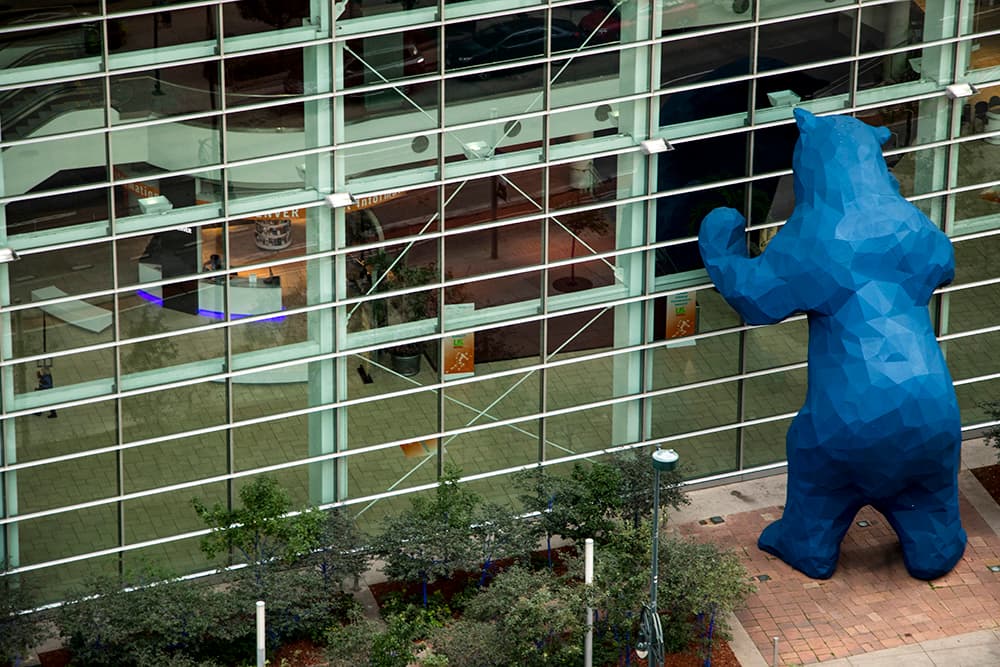
Loeb, who works with the Colorado Coalition for the Homeless, had showed up to Council to speak about what he described as "the travesty" of the camping ban. Instead, he used his time to defend his home at the Aloft Hotel and ask for the same respect other downtown residents are afforded.
Loeb has lived at the hotel since December of 2020, shortly after he lost a landscaping job.
"I have a chronic mental illness," he said. "I've been working nevertheless, as a public servant in the City and County of Denver, for over a quarter of a century. If it was not for this program, people like me who are 71-plus would not be alive. I want to make it clear that people with disabilities who are unable to basically work have a simple right to have a place that is safe to live.
"We are members of the community of Downtown Denver," he continued. "We are members of this community as a whole. We actually have a vested interest in the care and welfare of this community... When you basically push people out of the city because of economic reasons, you are condemning the quality of life of all of us."
On Tuesday, City Council's Finance and Governance Committee weighed the issue. Councilmember Kniech used the occasion to look back on her decade in office.
"Anyone who believes we did not have homelessness on the streets or drug use in our public spaces in Denver before this hotel opened -- I'd be curious where they were living because, having been in this council for 10 years, these issues have been an issue every day in the city, long before this pandemic," she said. "And the idea that the assumption would be made that because we are providing a housing solution, it has somehow caused individuals to be sleeping on the streets ... is just, it's deeply concerning...
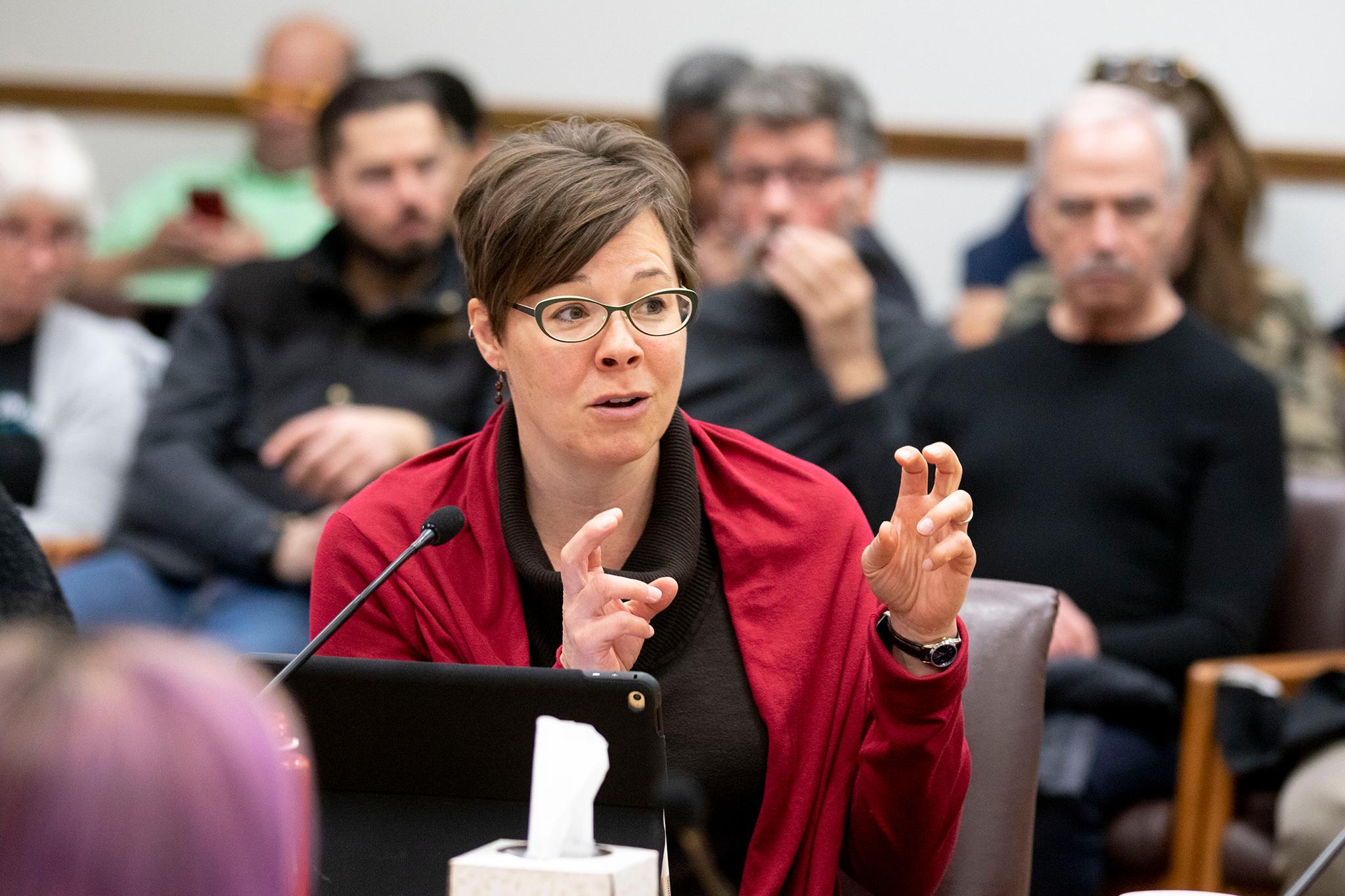
"Those issues are occurring in places all over our city that may not have a shelter, a long-term hotel stay, or other types of service," Kniech said. She described the shelter at the Aloft Hotel as an essential service and a part of the city's larger strategy to bring people inside and alleviate the issues for those without a home.
"I think that our overall community is better off with more individuals inside than having 25%, potentially, of these residents returning to street homelessness," she said. "That would not help this community or any other communities."
The committee moved the contract renewal to a full City Council vote.

